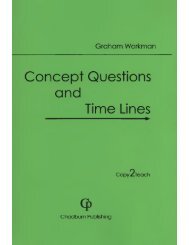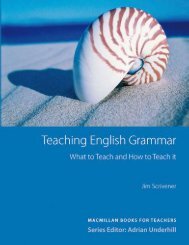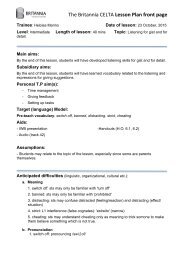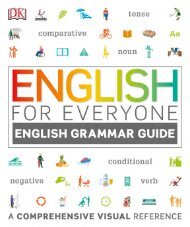Create successful ePaper yourself
Turn your PDF publications into a flip-book with our unique Google optimized e-Paper software.
Trainee: Gabriela Queiroz<br />
The Britannia <strong>CELTA</strong> <strong>Lesson</strong> <strong>Plan</strong> front page<br />
Date of lesson: April 17th<br />
Level: Elementary Length of lesson: 40 mins Topic: <strong>Grammar</strong> – adverbs of<br />
frequency<br />
Main aims:<br />
By the end of the lesson, Ss will have practiced the adverbs of frequency and will be better able to<br />
talk about their routine.<br />
Subsidiary aims:<br />
By the end of the lesson, Ss will have developed their pronunciation.<br />
Personal T.P aim(s):<br />
To give more time for the Ss answer and repeat.<br />
Target (language) Model:<br />
How often do you go to the Cinema? I usually go to the cinema on fridays.<br />
Aids:<br />
calendar, photos<br />
Assumptions:<br />
Ss will understand the concept of frequency when relating with the calendar on the board.<br />
Ss will know vocabulary from previous lessons.<br />
Anticipated difficulties (linguistic,<br />
organizational, cultural etc.):<br />
Ss may not understand instructions to some<br />
tasks.<br />
Solutions:<br />
Demonstrate the task to them.
The Britannia <strong>CELTA</strong> Language Analysis<br />
Language Analysis grammar vocabulary functions skills 1<br />
Analysis of Meaning<br />
(Simple statements of meaning)<br />
I usually go to the cinema.<br />
always<br />
sometimes<br />
never<br />
I`m usually at home on sundays.<br />
Never<br />
sometimes<br />
always<br />
How often do you go..?<br />
Adverbs of frequency. How often one does<br />
something.<br />
Analysis of Pronunciation<br />
(Simple statements of meaning)<br />
Anticipated Problems<br />
Ss may have trouble because there is no<br />
similarity with L1.<br />
Anticipated Problems<br />
Possible solutions<br />
e.g. (CCQs (inc. answers), timelines, clines, visuals<br />
etc.)<br />
Show a calendar on the board with activities.<br />
Point to an activity that occurs every day and<br />
ask “<br />
how often does Ammy have breakfast? Is it<br />
sometimes?” (no) “is it always?” (yes)<br />
Relate the adverbs with a bar from 0% to<br />
100%.<br />
Possible solutions<br />
e.g. (CCQs (inc. answers), timelines, clines, visuals<br />
etc.)<br />
I Usually /ˈjuː.ʒu.ə.li/ go to the cinema<br />
Never /ˈnev.ər/<br />
Sometimes /ˈsʌm.taɪmz/<br />
Always /ˈɔːl.weɪz/<br />
How often do you go to the cinema?<br />
/ˈɒf.ən/<br />
Ss may stress the wrong syllable<br />
Ss may say /ˈjuː.zu.ə.li/<br />
Ss may pronounce extra syllables e.g.<br />
/ˈsʌm.taɪ.miz/<br />
Drill the adverbs chorally and individually,<br />
using hands to show the stress. When you<br />
present the written form, ask Ss to underline<br />
the stress.<br />
1<br />
In the rare event of a skills lesson with absolutely no target language envisaged, please justify
The Britannia <strong>CELTA</strong> Language Analysis<br />
Analysis of Form<br />
(Simple statements of meaning)<br />
I usually go to the cinema.<br />
Subj +adverb+ verb<br />
I`m usually at home on sundays.<br />
Subj + verb to be + adverb<br />
Anticipated Problems<br />
Ss may forget that with the verb “to be” the<br />
adverb comes after and write “I always am<br />
late”<br />
Possible solutions<br />
e.g. (CCQs (inc. answers), timelines, clines, visuals<br />
etc.)<br />
Drill the sentences and then show them on the<br />
board the structure, using tables<br />
I<br />
He<br />
She<br />
It<br />
We<br />
You<br />
They<br />
+ Verb to be<br />
+ always,<br />
usually,<br />
sometimes,<br />
never<br />
+ always,<br />
usually,<br />
sometimes,<br />
never<br />
+ verb<br />
Anticipated problems with tasks and materials<br />
e.g.<br />
a) Ss might not understand new vocabulary in a text<br />
b) complicated instructions for a task<br />
c) difficult listening tasks<br />
Possible solutions<br />
e.g.<br />
a) pre-teach vocabulary<br />
b) do a clear demonstration using a student<br />
c) pause CD to give Ss time to write
The Britannia <strong>CELTA</strong> <strong>Lesson</strong> <strong>Plan</strong> detail<br />
Name: Gabriela Queiroz Date: April 17th Length: 20 mins<br />
Stage T Int Aim/Purpose Procedure Tutor’s comments<br />
Lead-in 2 T-Ss -Ss<br />
Feedback 2 S-T<br />
To make a quick review<br />
of the verb To Be<br />
To elicit the correct<br />
answer<br />
Build context 4 T-S- To introduce Amy and<br />
her calendar with the<br />
frequency of her activities<br />
Say “let`s play a game, you are team A<br />
and you team B” and divide the class<br />
so they can see. Give to each S of team<br />
A a piece of paper with a personal<br />
pronoun and say “you have the<br />
pronouns I, He, She, It, We, You,<br />
They” and to team B a piece of paper<br />
with a conjugation and say “you have<br />
the conjugations Are, Am, Is. Team A<br />
and team B, stand up and find your<br />
correct pair, you have 30 seconds!<br />
Go!” While they are looking, put on<br />
the board a<br />
table to complete the conjugation.<br />
When they finish, call one pair to<br />
come to the board and ask other Ss if<br />
their match is correct and so on, until<br />
the table is complete.<br />
Show on the board a picture of Amy<br />
holding a calendar. Say “this is Amy<br />
and what is this?” (Ss will not know)<br />
“This is a calendar.” Show<br />
pictures on the board of an office, a<br />
gym a cinema and a football game”.<br />
Elicit from Ss about each picture<br />
asking “where is this?” “what is this”<br />
(Ss will probably answer about the<br />
pictures because they learned about<br />
routine and places in previous
The Britannia <strong>CELTA</strong> <strong>Lesson</strong> <strong>Plan</strong> detail<br />
Stage T Int Aim/Purpose Procedure Tutor’s comments<br />
Model sentence<br />
Highlight<br />
meaning<br />
5 T-S<br />
To introduce Ss to the adverbs<br />
of frequency<br />
3 T-Ss To ensure that Ss understood<br />
the meaning of each<br />
adverb, asking CCQs<br />
lessons).<br />
Show on the board a calendar with<br />
Amy`s routine (work, gym, cinema)<br />
And ask “How often does she go to<br />
work?” (wait for Ss answers)<br />
“she always goes to work during the<br />
week” and ask “and during the<br />
weekend?” (Ss will understand she<br />
doesn`t go to work on weekends) and<br />
you say “she never goes to work on<br />
weekends. On Sundays she is usually<br />
at home” Say “How often does she go<br />
to the gym?” Point to the days of the<br />
week she goes and answer “She<br />
usually goes to the gym”. Point to the<br />
calendar to show the cinema only 2<br />
times a month (on sundays) and say<br />
“How often does she go to the<br />
cinema?” wait for<br />
answers and say “she sometimes goes<br />
to the cinema”.<br />
Leave the calendar on the board and<br />
add a small bar from 0% to 100%.<br />
Point to the work activity and ask<br />
“How often does she go to work?” and<br />
give Ss options “is it never?” (no) “is<br />
it sometimes?” (no) is it always?”<br />
(yes) draw a bar reaching 100%. Point<br />
to the gym and ask the same “how<br />
often does she go to the gym? Is it<br />
always?” (no) “is it never?” (no) “is it<br />
usually?” (yes). Draw a bar almost
The Britannia <strong>CELTA</strong> <strong>Lesson</strong> <strong>Plan</strong> detail<br />
Stage T Int Aim/Purpose Procedure Tutor’s comments<br />
Highlight<br />
pronunciation<br />
Highlight<br />
form<br />
Controlled<br />
practice<br />
3 T-S<br />
3 T-S<br />
3 T-S-S<br />
feedback 3 S-T-S<br />
Controlled<br />
practice<br />
2 S-S<br />
To ensure Ss learn the<br />
correct pronunciation of<br />
the adverbs.<br />
To present the written<br />
form.<br />
To reinforce the structure<br />
of sentences.<br />
To give the answers and<br />
check where the mistakes<br />
are.<br />
To reinforce the meaning<br />
of the adverbs<br />
reaching 100%. Do the same with the<br />
2 remaining activities (cinema and<br />
football).<br />
Drill the adverbs chorally and<br />
individually using hands to show the<br />
stress. Drill also “how often” inside<br />
the question “how often do you go to<br />
work?”<br />
Show on the board the written<br />
sentences they were speaking and<br />
listening to this whole time e.g.“She<br />
always goes to work” and “She is<br />
usually at home on sundays” to point<br />
the difference when using the verb to<br />
be.<br />
Give instructions for the task “Read<br />
and put the words in correct order”.<br />
Give them the sheets. Demonstrate on<br />
the board the first one. Say “you have<br />
3 minutes!”.<br />
When they finish, ask them to compare<br />
their answers in pairs. Then, elicit the<br />
answers from Ss, correcting on the<br />
spot if they make a mistake.<br />
Divide the class in two teams. To<br />
Team A, give each S a piece of paper<br />
with an adverb and to team B give the<br />
pieces with 0%, 25%, 75% and 100%.<br />
and say “Team A, you have adverbs<br />
always, usually, sometimes and never”<br />
and team B, you have numbers. Stand<br />
up and find the correct pair. 30
The Britannia <strong>CELTA</strong> <strong>Lesson</strong> <strong>Plan</strong> detail<br />
Stage T Int Aim/Purpose Procedure Tutor’s comments<br />
seconds! Go!” While they are looking<br />
for their pair, show on the board a bar<br />
from 0% to 100% .<br />
feedback 2 S-S<br />
Freer practice 8 S-S<br />
To give the answers and<br />
check where the mistakes<br />
are.<br />
To make Ss use on their<br />
own the adverbs they<br />
were exposed to on this<br />
lesson.<br />
Monitor each pair to check if they did<br />
correctly. If there is a mistake, call and<br />
ask for Ss to help and look for the<br />
correct pair. If there are no mistakes,<br />
go to the board, point to the bar and<br />
call the pairs one at a time to complete<br />
their adverb on the board next to the<br />
corresponding number.<br />
Suddenly start a recording playing<br />
some opening news theme to get Ss<br />
attention and hold a microphone with a<br />
TV logo in front of you. When the<br />
music finishes, ask a strong S to come<br />
next to you and start talking as if you<br />
were a reporter “Good morning, we<br />
are here at Britannia with student<br />
Vinicius. Vinicius, How often do you<br />
have a shower?” (answer) “and how<br />
often do you go to work?” (answer)<br />
“thank you” Now, pass the microphone<br />
to Vinicius so he can make 2<br />
questions to another Ss and so on until<br />
all (or most) Ss get a chance to be the<br />
reporter. If needed, ask for the<br />
microphone back and interview the<br />
weaker Ss, since the other Ss tend not<br />
to choose them.
The Britannia <strong>CELTA</strong> <strong>Lesson</strong> <strong>Plan</strong> detail<br />
Stage T Int Aim/Purpose Procedure Tutor’s comments<br />
Model sentence<br />
Highlight<br />
meaning<br />
5 T-S<br />
To introduce Ss to the adverbs<br />
of frequency<br />
3 T-Ss To ensure that Ss understood<br />
the meaning of each<br />
adverb, asking CCQs<br />
lessons).<br />
Show on the board a calendar with<br />
Amy`s routine (work, gym, cinema)<br />
And ask “How often does she go to<br />
work?” (wait for Ss answers)<br />
“she always goes to work during the<br />
week” and ask “and during the<br />
weekend?” (Ss will understand she<br />
doesn`t go to work on weekends) and<br />
you say “she never goes to work on<br />
weekends. On Sundays she is usually<br />
at home” Say “How often does she go<br />
to the gym?” Point to the days of the<br />
week she goes and answer “She<br />
usually goes to the gym”. Point to the<br />
calendar to show the cinema only 2<br />
times a month (on sundays) and say<br />
“How often does she go to the<br />
cinema?” wait for<br />
answers and say “she sometimes goes<br />
to the cinema”.<br />
Leave the calendar on the board and<br />
add a small bar from 0% to 100%.<br />
Point to the work activity and ask<br />
“How often does she go to work?” and<br />
give Ss options “is it never?” (no) “is<br />
it sometimes?” (no) is it always?”<br />
(yes) draw a bar reaching 100%. Point<br />
to the gym and ask the same “how<br />
often does she go to the gym? Is it<br />
always?” (no) “is it never?” (no) “is it<br />
usually?” (yes). Draw a bar almost
The Britannia <strong>CELTA</strong> <strong>Lesson</strong> <strong>Plan</strong> detail<br />
Stage T Int Aim/Purpose Procedure Tutor’s comments<br />
Highlight<br />
pronunciation<br />
Highlight<br />
form<br />
Controlled<br />
practice<br />
3 T-S<br />
3 T-S<br />
3 T-S-S<br />
feedback 3 S-T-S<br />
Controlled<br />
practice<br />
2 S-S<br />
To ensure Ss learn the<br />
correct pronunciation of<br />
the adverbs.<br />
To present the written<br />
form.<br />
To reinforce the structure<br />
of sentences.<br />
To give the answers and<br />
check where the mistakes<br />
are.<br />
To reinforce the meaning<br />
of the adverbs<br />
reaching 100%. Do the same with the<br />
2 remaining activities (cinema and<br />
football).<br />
Drill the adverbs chorally and<br />
individually using hands to show the<br />
stress. Drill also “how often” inside<br />
the question “how often do you go to<br />
work?”<br />
Show on the board the written<br />
sentences they were speaking and<br />
listening to this whole time e.g.“She<br />
always goes to work” and “She is<br />
usually at home on sundays” to point<br />
the difference when using the verb to<br />
be.<br />
Give instructions for the task “Read<br />
and put the words in correct order”.<br />
Give them the sheets. Demonstrate on<br />
the board the first one. Say “you have<br />
3 minutes!”.<br />
When they finish, ask them to compare<br />
their answers in pairs. Then, elicit the<br />
answers from Ss, correcting on the<br />
spot if they make a mistake.<br />
Divide the class in two teams. To<br />
Team A, give each S a piece of paper<br />
with an adverb and to team B give the<br />
pieces with 0%, 25%, 75% and 100%.<br />
and say “Team A, you have adverbs<br />
always, usually, sometimes and never”<br />
and team B, you have numbers. Stand<br />
up and find the correct pair. 30
The Britannia <strong>CELTA</strong> <strong>Lesson</strong> <strong>Plan</strong> detail<br />
Stage T Int Aim/Purpose Procedure Tutor’s comments<br />
seconds! Go!” While they are looking<br />
for their pair, show on the board a bar<br />
from 0% to 100% .<br />
feedback 2 S-S<br />
Freer practice 8 S-S<br />
To give the answers and<br />
check where the mistakes<br />
are.<br />
To make Ss use on their<br />
own the adverbs they<br />
were exposed to on this<br />
lesson.<br />
Monitor each pair to check if they did<br />
correctly. If there is a mistake, call and<br />
ask for Ss to help and look for the<br />
correct pair. If there are no mistakes,<br />
go to the board, point to the bar and<br />
call the pairs one at a time to complete<br />
their adverb on the board next to the<br />
corresponding number.<br />
Suddenly start a recording playing<br />
some opening news theme to get Ss<br />
attention and hold a microphone with a<br />
TV logo in front of you. When the<br />
music finishes, ask a strong S to come<br />
next to you and start talking as if you<br />
were a reporter “Good morning, we<br />
are here at Britannia with student<br />
Vinicius. Vinicius, How often do you<br />
have a shower?” (answer) “and how<br />
often do you go to work?” (answer)<br />
“thank you” Now, pass the microphone<br />
to Vinicius so he can make 2<br />
questions to another Ss and so on until<br />
all (or most) Ss get a chance to be the<br />
reporter. If needed, ask for the<br />
microphone back and interview the<br />
weaker Ss, since the other Ss tend not<br />
to choose them.











